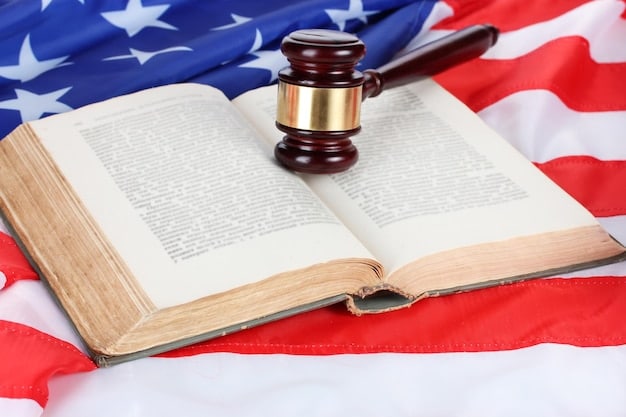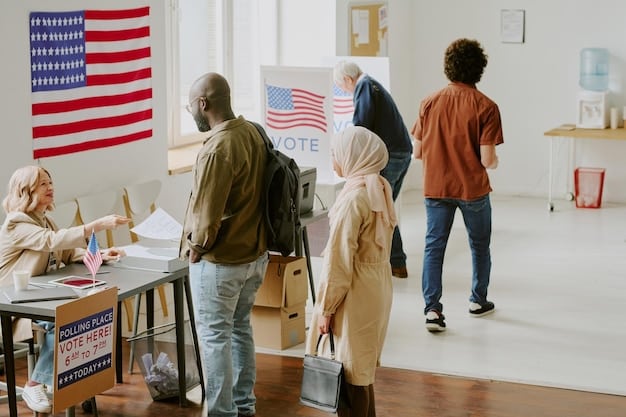Breaking: Supreme Court to Hear Voting Rights Case in November

The Supreme Court has announced it will hear a pivotal case on voting rights in November, raising critical questions about election laws and their potential impact on voter access and representation in the United States.
The Supreme Court to Hear Case on Voting Rights in November, a move that could significantly reshape the landscape of election laws across the country. The case, which has been closely watched by legal experts and civil rights advocates, touches upon fundamental questions about voter access and representation.
Supreme Court Agrees to Hear Voting Rights Case
The Supreme Court’s decision to hear this voting rights case signals its willingness to address complex and contentious issues surrounding elections. The case could have far-reaching implications for states and local jurisdictions, potentially leading to changes in how elections are conducted and how voting rights are protected.
Understanding the background and context of this case is crucial for grasping its potential impact. The issues at stake touch upon the very foundation of democracy and the ability of all citizens to participate in the political process.

The Legal Framework
The legal arguments presented in the case are expected to center on interpretations of the Constitution and existing federal laws. Key aspects of the legal framework include:
- Constitutional Provisions: The case may involve questions related to the Equal Protection Clause of the Fourteenth Amendment and the Fifteenth Amendment, which prohibits denying or abridging the right to vote based on race.
- Voting Rights Act: Section 2 of the Voting Rights Act is often invoked in cases challenging voting practices that allegedly discriminate against minority voters.
- Past Precedents: The Supreme Court’s prior rulings on voting rights cases, such as *Shelby County v. Holder*, will likely be important references in the arguments.
Changes to voting laws implemented by various states have raised concerns about potential voter suppression and discrimination. These concerns have led to increased litigation and heightened scrutiny of election practices.
In summary, the Supreme Court’s decision to hear this case is a significant development in the ongoing debate over voting rights. The legal framework and the arguments presented will shape the future of elections and voter access in the United States.
Background of the Case
To fully understand the magnitude of the Supreme Court hearing a voting rights case, it’s essential to delve into the history and the events that led to this moment. This case arrives at a time when voting rights are a particularly hot issue in American politics.
The specific details of the case involve a challenge to certain state laws that advocates argue restrict voter access, particularly for minority groups. Understanding the context is essential to appreciating the potential implications of this Supreme Court decision.
Origins of the Dispute
The origins of the dispute stem from a series of changes to state election laws. These changes encompassed several areas:
- Voter ID Laws: Stricter identification requirements for voting.
- Early Voting Restrictions: Limitations on the availability of early voting options.
- Registration Procedures: More stringent requirements for voter registration.
- Polling Place Closures: Reduction in the number of polling locations, particularly in minority-heavy areas.
This case revolves around claims that these new election regulations unduly burden voters, especially those from minority communities. Proponents of these laws argue that they are necessary to prevent voter fraud and enhance election integrity.
Ultimately, the Supreme Court’s decision will be critical in determining the permissible scope of state authority in regulating elections. The case highlights the ongoing tension between ensuring election integrity and protecting the right to vote.
Key Arguments and Perspectives
As the Supreme Court prepares to hear arguments in the voting rights case, it’s crucial to understand the key perspectives and legal arguments that will be presented. Both sides have strong opinions on the matter.
Understanding these competing viewpoints is essential for assessing the potential impact of the Supreme Court’s decision and its broader implications for voting rights in the United States.

Arguments in Favor of Voting Rights Protections
Advocates for stronger voting rights protections argue that the challenged laws disproportionately affect minority voters and impede their ability to participate in the democratic process. These arguments often emphasize:
The Supreme Court’s ruling in this case will have far-reaching consequences, impacting the balance between state authority and federal protection of voting rights.
- Disparate Impact: Evidence that the laws have a discriminatory effect on specific demographic groups.
- Historical Context: The history of voter suppression and discrimination in the region.
- Fundamental Right to Vote: The importance of ensuring that all eligible citizens can exercise their right to vote without undue burden.
Arguments for Election Integrity
Those who support the challenged election laws assert that they are essential for maintaining election integrity and preventing voter fraud. Their arguments often include:
- Preventing Fraud: The necessity of safeguards to ensure that only eligible voters cast ballots.
- Uniform Standards: The importance of establishing clear and consistent rules for all voters.
- Public Confidence: The need to promote public confidence in the fairness and accuracy of elections.
The arguments in this case highlight the fundamental tension between ensuring the integrity of elections and protecting the right to vote. The Supreme Court’s decision will likely set important precedents for future voting rights cases.
Potential Outcomes and Implications
The Supreme Court’s decision in the voting rights case could have wide-ranging implications for the future of elections in the United States. The direction they decide to go could make great waves in America.
Whatever the ultimate outcome, the Supreme Court’s decision will shape the legal landscape of voting rights and influence the balance of power between the federal government and the states.
Possible Rulings
The Supreme Court could issue a variety of rulings, each with different consequences:
These are all potential outcomes in the upcoming Supreme Court hearing. Any of these outcomes will make an impact on voter rights.
- Uphold the Laws: The Court could uphold the challenged state laws, finding that they do not violate the Constitution or federal law.
- Strike Down the Laws: The Court could strike down the laws, concluding that they unconstitutionally restrict the right to vote.
- Narrow Ruling: The Court could issue a narrower ruling that addresses specific aspects of the laws without making a broad pronouncement on their overall validity.
Impact on Future Elections
The decision could set precedents that influence future elections in several ways:
- Voter Access: The extent to which states can impose restrictions on voting without violating federal law.
- Minority Representation: The protection of minority voters’ access to the ballot box and their ability to elect candidates of their choice.
- Election Administration: The balance between ensuring election integrity and promoting voter participation.
The Supreme Court’s decision will have far-reaching consequences, impacting the balance between state authority and federal protection of voting rights. The outcome will shape the future of elections and voter access in the United States.
The Supreme Court’s Role
The Supreme Court’s role in adjudicating voting rights cases is paramount, as its decisions can significantly impact the accessibility and fairness of elections across the nation. What the Supreme Court decides can change people’s lives forever.
Looking ahead, the Supreme Court’s decisions on voting rights will continue to shape the landscape of American democracy, influencing voter participation, election integrity, and the representation of diverse communities.
Historical Context
The Supreme Court has a long history of involvement in voting rights cases, dating back to the Reconstruction era. Landmark decisions include:
- *Baker v. Carr* (1962): Established the principle of “one person, one vote” in legislative districts.
- *Reynolds v. Sims* (1964): Affirmed that state legislative districts must be roughly equal in population.
- *Shelby County v. Holder* (2013): Struck down a key provision of the Voting Rights Act, leading to changes in election laws in several states.
Current Significance
In the current political climate, the Supreme Court’s role in voting rights cases is particularly critical. The Court is now tasked with balancing competing interests:
- Protecting the Right to Vote: Ensuring that all eligible citizens have equal access to the ballot box.
- Maintaining Election Integrity: Preventing voter fraud and ensuring the accuracy of election results.
- Interpreting the Constitution: Applying constitutional principles to contemporary voting rights challenges.
The Supreme Court’s rulings in these cases will have profound implications for the future of American democracy. The Court’s decisions will shape the legal and political landscape of voting rights for years to come.
Expert Opinions and Analysis
The Supreme Court’s decision to hear a voting rights case has prompted a wide range of expert opinions and analysis from legal scholars, political scientists, and civil rights advocates. These insights provide valuable context and perspective on the potential impact of the case.
As the Supreme Court prepares to hear arguments in this crucial voting rights case, the insights offered by experts will help inform public understanding and shape the ongoing debate over the future of American democracy.
Legal Scholars
Legal scholars offer diverse perspectives on the legal and constitutional issues at stake. Some argue that the challenged voting laws violate fundamental principles of equal protection and voter access, while others contend that they are necessary for maintaining election integrity.
Whatever the outcome, the expert opinions and analyses surrounding this case will continue to shape the debate over voting rights and election administration.
- Constitutional Interpretation: Scholars debate the proper interpretation of constitutional provisions related to voting rights, such as the Equal Protection Clause and the Fifteenth Amendment.
- Voting Rights Act: Experts analyze the scope and impact of the Voting Rights Act and its role in protecting minority voters.
- Precedent and Stare Decisis: Legal scholars examine how prior Supreme Court decisions should inform the current case.
Political Scientists
Political scientists focus on the broader political and social implications of the case. They analyze how the decision could affect voter turnout, minority representation, and political polarization.
- Voter Turnout: Experts study how changes in voting laws influence voter participation rates.
- Political Polarization: Political scientists examine the relationship between voting rights and partisan divisions.
- Public Opinion: Experts gauge public attitudes toward voting rights and election procedures.
| Key Aspect | Brief Description |
|---|---|
| 🗳️ Case Background | Supreme Court to hear arguments on state voting laws challenged as discriminatory. |
| ⚖️ Legal Arguments | Focus on constitutional provisions and the Voting Rights Act. |
| 🏛️ Potential Outcomes | Court could uphold or strike down laws, setting precedents for future elections. |
| 📢 Expert Analysis | Legal scholars and political scientists offer diverse perspectives on the case. |
Frequently Asked Questions
▼
The central issue concerns the legality of certain state voting laws that are being challenged as discriminatory, potentially restricting access for minority voters.
▼
This case is important because it may significantly alter election practices and voter access, influencing the balance between state authority and federal protection of voting rights.
▼
The Supreme Court could uphold the laws, strike them down, or issue a narrow ruling, each with different impacts on future elections and voter participation.
▼
The Voting Rights Act is often invoked in cases challenging voting practices that allegedly discriminate against minority voters, influencing the legal arguments presented.
▼
Key figures to watch include the Supreme Court justices, legal scholars, and civil rights advocates who are closely monitoring the case and providing expert analysis.
Conclusion
The Supreme Court’s decision to hear this voting rights case in November marks a crucial moment for American democracy. The legal arguments, potential outcomes, and expert insights surrounding this case will shape the future of elections, voter access, and minority representation in the United States. As the nation awaits the Court’s ruling, it is imperative to remain informed and engaged in the ongoing debate over voting rights and the fundamental principles of democratic governance.





